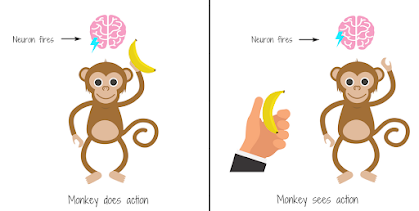Before Neurophysiologist Giacomo Rizzolatti and his colleagues discovered a class of cells called "mirror neurons", scientists were under the impression that the brain has a set way to control and coordinate your body. Before Rizzolatti, it was believed that there were set parts of your brain responsible for action planning, meaning if you want to control or move your body your brain has the premotor and parietal cortexs to help you do so. In the mid 90s Rizzolatti how cells in the motor area of a monkey's brain was associated with planning hand and mouth movements. They were monitoring the cells while the monkey was grabbing raisins and eating them. Once the monkey took a break from eating the raisins, an experimenter reached for the raisins. Although the monkey did not reach for the raisins, it watched the experimenter do so and parts of the motor brain (motor cells) reacted as if the monkey was the one reaching for the raisins. Basically "monkey see, monkey brain do".
The researchers later found that certain motor cells responded to certain type of stimulation, for example seeing an action being performed involving a hand movement resulted in the cells corresponded with hand movements to be triggered. Same with mouth movements. They classified these cells as "mirror neurons". With time scientists found that there are different subtypes of mirror neurons, some respond to very definitive details of actions. For example a subtype may be responsive to the specific movement of someone using their thumb and index finger grasping an object. Another subtype may be responsive to the broad movement of using any part of the hand to grab the object. Many of these mirror neurons respond to multisensory information; for example, the cells that interpret hand tapping actions are responsive to both the sight and sound of the tapping. Even if the actual target that is being grabbed is visually obstructed, the mirror neurons can basically assume that the subject is going to grab something. This has some scientists thinking, these mirror neurons don't only registered a recognized action, they register the subjects' (animal or human) intention, although it is a controversial idea.Friday, June 16, 2023
Subscribe to:
Post Comments (Atom)


No comments:
Post a Comment